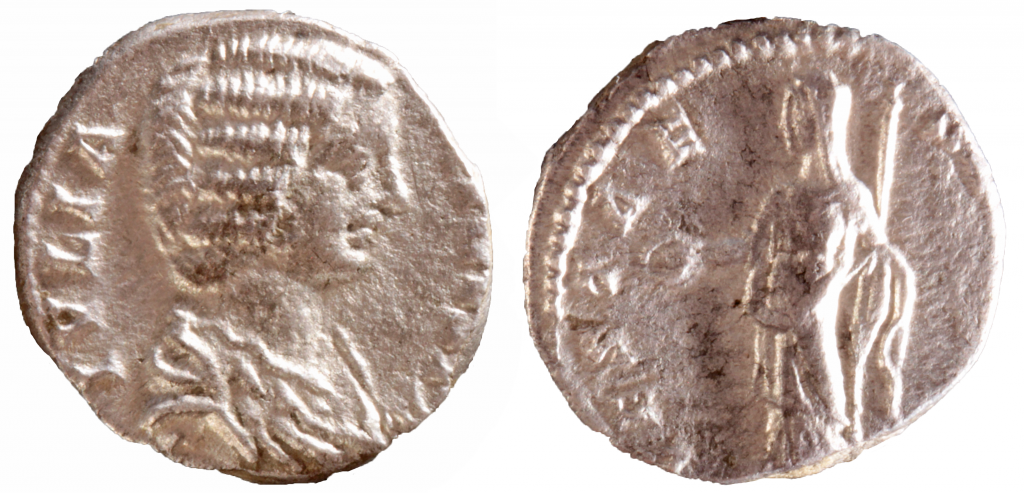April 13, 2015, by Will Leveritt
On this day in 195 Julia Domna was awarded the title mater castrorum
Text by Lauren Shelton
Image by Kelly Grimshaw
Born in AD 170 to Julius Bassianus – a local Syrian aristocrat, member of the royal family of Emesa, and high-priest of the sun god Elgabal – Julia Domna was the second wife of Emperor Septimius Severus (193-211), whom she married at some point in the 180s. In 193, when her husband became emperor, the title of Augusta was conferred upon her. Two years later, on the 14th of April in 195, she was also given the title of mater castrorum – ‘mother of the [army] camps’.

AR denarius of Julia Domna. Obverse has draped head of empress right, IVLIA AVGVSTA. Reverse has Vesta left with patera and staff, VESTAE SANCTAE. 16mm, 2.66g, 12 o’clock.
There are two key reasons for the conferral of this title. Firstly, since Severus rose to the position of emperor on the back of civil war, he was obliged to neutralize the other claimants to the throne. And Julia, against the normal expectations for a Roman matron, was not content to remain at home but instead joined her husband on his eastern campaign against his rival, Pescennius Niger, living within the army camps alongside the soldiery.
The other key factor behind the conferral of this title was propaganda-driven: as this was an extremely unstable time for the Severus and the new imperial family, this title fostered a sense of connection between the army and the ruling dynasty and helped make the likelihood of a military coup against them much less likely. By helping to secure the loyalty of the Roman army, Julia Domna’s title of mater castrorum helped to stabilize and legitimize Septimius Severus’s rule and to ensure the eventual accession of his sons, Caracalla and Geta.
A shrewd and intelligent politician, Julia Domna was greatly respected by her husband, who often sought her advice on political matters. A patron of the arts and learning, she also invited many great Roman and Greek philosophers and sophists, such as the writer Philostratus, to the imperial court, building up a great centre of learning within the imperial court.
When her husband died in February 211, Julia attempted to keep the peace between her two sons, who had succeeded their father as joint emperors but were on poor terms with each other. She was ultimately unable to prevent Caracalla’s assassination of Geta in December of the same year. Thereafter, relations between mother and surviving son were strained, yet she still accompanied him on his Parthian adventure in 217.
A very influential empress, Julia Domna died in 217 at the age of 46/7, choosing to stave herself to death upon learning of the murder of Caracalla and the accession of the Praetorian Prefect Macrinus, the man who probably orchestrated the death of her son.
No comments yet, fill out a comment to be the first

Leave a Reply